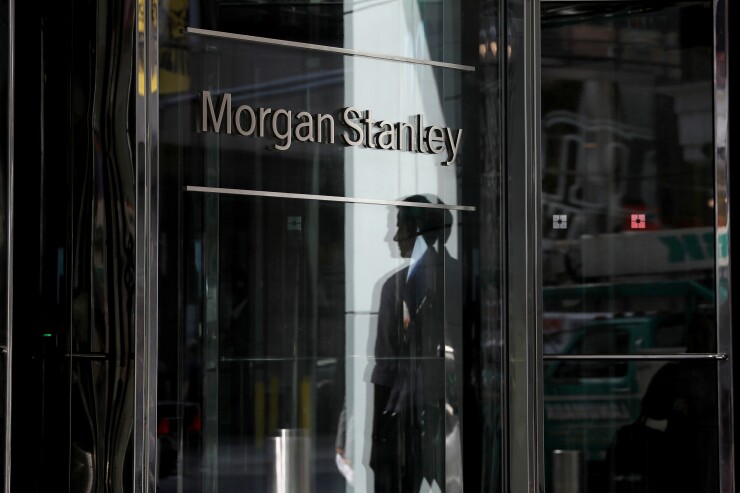A birthday card list may have helped Morgan Stanley win a temporary restraining order against a $600 million team that departed for Stifel, constraining the advisors’ ability to contact former clients.
That detail and others helped tipped the scales in Morgan Stanley’s favor following a three-month court battle between the firm and six advisors who decamped to Stifel in September.
The firm promptly sued the Bourbonnais, Illinois-based team, accusing advisors Zachary Birkey, Ronald Ouwenga, Jeff Schimmelpfennig, Myron Hendrix, Brian Thomas and Michael Bruner of breach of contract and violating non-solicitation agreements.
The six brokers denied the allegations in court and argued that Morgan Stanley had
When the six advisors first decamped for Stifel, they represented most of Morgan Stanley’s branch office in Bourbonnais, Illinois, and counted the branch manager among their members.

Morgan Stanley’s
The judge, however, left leeway for Morgan Stanley to refile its motion for a restraining order following a discovery process that allows each side to seek evidence to buttress their case.
While the advisors initially asserted in court documents that they took no company documentation, they amended this in November to say that they had some client contact information in their personal cell phones, according to court records.
Nearly two-thirds of advisors surveyed this month said that internal training programs or workshops were offered by their firms.
Virtually every major firm on Wall Street has joined the push into private markets, with many trying to get in early on the biggest "next big thing" to hit financial services since the exchange-traded fund.
Traci Parks has been a copy editor at American Banker since 2023. She's worked at Scholastic National Partnerships and many fashion magazines, including V Magazine where she was also a contributing writer. As a playwright, her work has been produced in New York, Seattle and Los Angeles.
Ouwenga also said that years earlier he had signed up for a third-party website called the Birthday Card Company, according to court documents. By entering a person’s name, address and birthday, the person would automatically be sent a card and box of candy on his or her birthday. This was done at Ouwenga’s personal expense.
Morgan Stanley said that 347 names on Ouwenga’s list are clients of the firm, according to court documents.
Ouwenga said that he believed much of the information was publicly available. Still, he offered to end his subscription and give any birthday list in his possession to his lawyers. The advisors also offered to delete contact information from their personal cell phones.
“This shows at least some good faith, but it misses the larger point,” Judge Gottschall wrote in her ruling dated Dec. 20.
“What matters is the information, not the medium, and quite apart from whether that information qualifies for trade secret protection, the text of the [joint production agreements] and other agreements define protected information to include client names and contact information,” she writes.
Morgan Stanley had not identified any clients it lost due to the team’s solicitations, according to the judge. But it nonetheless met the requirements of a temporary restraining order based on the evidence produced during discovery; that the firm has some likelihood on the success on the merits of its underlying claims and that irreparable harm might be done to Morgan Stanley in the form of lost business.
“[E]ven if most former clients have made up their minds about staying with Morgan Stanley or switching to Stifel, continued unsuccessful solicitations can do damage a company’s goodwill,” she writes.
The judge ruled that the TRO would stand until a FINRA arbitration case filed simultaneously by Morgan Stanley against the team is resolved. That could happen quickly as FINRA rules require a hearing before arbitrators must be held within 15 days of a court issuing a temporary restraining order.
A Morgan Stanley spokeswoman and an attorney representing the advisors declined to comment on the case.








